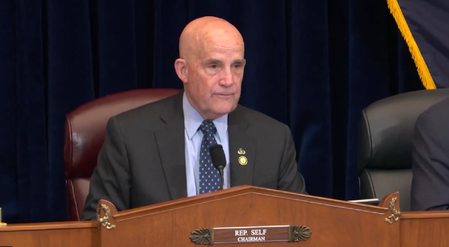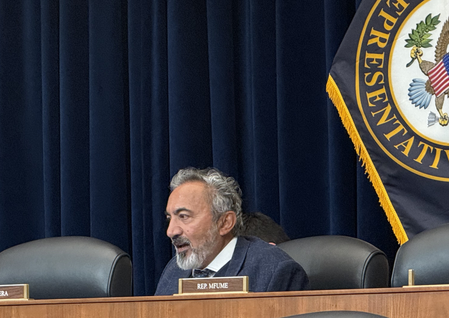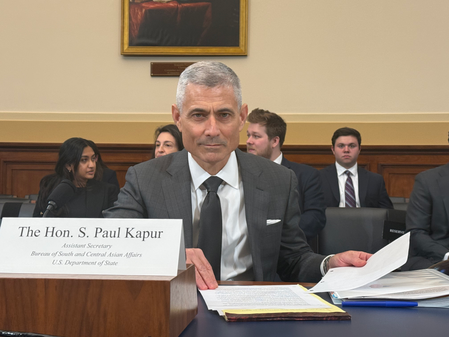Explainer
It is a scam spread across many states, that involves several thousand crore rupees and duped 3.2 million people.
The Andhra Pradesh Assembly witnessed drama for a second continuous day on Friday and was adjourned shortly after it began.
YSRC lawmakers crowded the well of the house and shouted slogans, until the Speaker adjourned the session.
This came just a day after YSRC alleged that the Speaker was working only at the behest of the Chief Minister N Chandrababu Naidu and the ruling Telugu Desam Party (TDP), and they wanted to move a no-confidence motion against him.
The YSRC took the decision after a bitter war of words between the two parties on the Agri Gold scam.
What is the Agri Gold scam?
It is a story that involves several thousand crore rupees and many states including Telangana, Andhra Pradesh, Tamil Nadu and Karnataka. 3.2 million people were duped in total.
To trace the issue, lets go back to 1995.
The company had just set up its roots in Vijayawada as a Collective Investment Scheme (CIS), with its chairman Avvas Venkata Rama Rao and a few others.
For the next 20 years, the company lured several lakh customers on the promise that their investment would come back to them with higher returns.
It also sent out several ‘agents’ to convince people to invest in the group of companies.
The company allegedly took this money and invested heavily in real estate, before branching out to other areas as well, all the while promising their customers that the returns would only increase.
In 2014, things slowly began to go downhill. In November that year, the company’s office in Vijayawada witnessed a tense scene as several customers landed there, reportedly saying that the cheques were bouncing and interest was not being paid.
By January 2015, thousands had turned up, saying that they were not getting their money back. Some of them had invested several lakh, while some had even invested a few crore rupees in the company.
The Andhra Pradesh police that month, registered several cases of cheating, fraud and irregularities against Rao, and raided his properties.
It was then revealed that the company was carrying out its operations without permission from the Reserve Bank of India (RBI) and Securities and Exchange Board of India (SEBI).
Several thousand agents also said that they were cheated by the company.
Within a few days, due to the sheer size of the scam, the case was transferred to the CID.
Addressing the media a week later, Andhra Finance Minister Yanamala Ramakrishnudu said that the company had amassed 16,000 acres of land in seven states, from the 30 lakh people besides deposits of more than Rs 500 crore in commercial banks.
The state government soon stepped in and issued a GO, attaching properties of the company. Following this, it set up a committee to decide on disposing the company’s assets, and assured the victims that they would get their money back.
The Hyderabad HC soon took notice of the case after a PIL, and ordered the CID to give it updates on the case.
In October 2015, the HC asked the state to speed up the auction of the company’s properties.
In February 2016, the CID officially arrested Chairman A Venkata Rama Rao, and Managing Director A Venkata Seshu Narayana Rao from Hyderabad.
However, they were released on conditional bail later.
In March 2016, the politics over the issue came to the fore as the Assembly was adjourned twice due to a ruckus created by the YSRCP, alleging that the state was not doing enough.
Not much changed for the protesting victims, besides the HC ruling that the auction of the company’s properties would be held in December that year.
The auction also was not of much help, as many properties did not find a bidder, seemingly due to the demonetisation of Rs 500 and Rs 1,000 notes.
While CM Naidu promised to pay Rs 3 lakh for each person who had committed suicide after losing money, justice continued to elude several victims.
In the first week of March, several victims of the scam sat on a mass hunger strike in Vijayawada, stating that the government’s apathy had forced them onto the streets.
The protesters finally broke their fast on Thursday after a delegation met Naidu, who assured them that the auction process would be speeded up. Jagan also met with the leaders of the victims, and offered them juice, to break their fast.
Meanwhile, Jagan kicked up a storm in the Assembly on Thursday after he alleged that Agriculture Minister P Pulla Rao was involved in the purchase of Agri Gold properties.
Jagan alleged that Rao’s wife bought the properties even after the probe began into allegations against the company for cheating depositors.
On Friday, Rao challenged Jagan to prove his allegations or get expelled from the house.
“I am ready for the same punishment if proved guilty,” he declared.
The TDP maintained that the proceedings should only continue after Jagan accepted the challenge or apologised for his remarks, while the YSRC alleged that Jagan was not given a chance to speak fully on the issue.
With both sides reaching a deadlock, the speaker adjourned the house.
YSRC lawmakers crowded the well of the house and shouted slogans, until the Speaker adjourned the session.
This came just a day after YSRC alleged that the Speaker was working only at the behest of the Chief Minister N Chandrababu Naidu and the ruling Telugu Desam Party (TDP), and they wanted to move a no-confidence motion against him.
The YSRC took the decision after a bitter war of words between the two parties on the Agri Gold scam.
What is the Agri Gold scam?
It is a story that involves several thousand crore rupees and many states including Telangana, Andhra Pradesh, Tamil Nadu and Karnataka. 3.2 million people were duped in total.
To trace the issue, lets go back to 1995.
The company had just set up its roots in Vijayawada as a Collective Investment Scheme (CIS), with its chairman Avvas Venkata Rama Rao and a few others.
For the next 20 years, the company lured several lakh customers on the promise that their investment would come back to them with higher returns.
It also sent out several ‘agents’ to convince people to invest in the group of companies.
The company allegedly took this money and invested heavily in real estate, before branching out to other areas as well, all the while promising their customers that the returns would only increase.
In 2014, things slowly began to go downhill. In November that year, the company’s office in Vijayawada witnessed a tense scene as several customers landed there, reportedly saying that the cheques were bouncing and interest was not being paid.
By January 2015, thousands had turned up, saying that they were not getting their money back. Some of them had invested several lakh, while some had even invested a few crore rupees in the company.
The Andhra Pradesh police that month, registered several cases of cheating, fraud and irregularities against Rao, and raided his properties.
It was then revealed that the company was carrying out its operations without permission from the Reserve Bank of India (RBI) and Securities and Exchange Board of India (SEBI).
Several thousand agents also said that they were cheated by the company.
Within a few days, due to the sheer size of the scam, the case was transferred to the CID.
Addressing the media a week later, Andhra Finance Minister Yanamala Ramakrishnudu said that the company had amassed 16,000 acres of land in seven states, from the 30 lakh people besides deposits of more than Rs 500 crore in commercial banks.
The state government soon stepped in and issued a GO, attaching properties of the company. Following this, it set up a committee to decide on disposing the company’s assets, and assured the victims that they would get their money back.
The Hyderabad HC soon took notice of the case after a PIL, and ordered the CID to give it updates on the case.
In October 2015, the HC asked the state to speed up the auction of the company’s properties.
In February 2016, the CID officially arrested Chairman A Venkata Rama Rao, and Managing Director A Venkata Seshu Narayana Rao from Hyderabad.
However, they were released on conditional bail later.
In March 2016, the politics over the issue came to the fore as the Assembly was adjourned twice due to a ruckus created by the YSRCP, alleging that the state was not doing enough.
Not much changed for the protesting victims, besides the HC ruling that the auction of the company’s properties would be held in December that year.
The auction also was not of much help, as many properties did not find a bidder, seemingly due to the demonetisation of Rs 500 and Rs 1,000 notes.
While CM Naidu promised to pay Rs 3 lakh for each person who had committed suicide after losing money, justice continued to elude several victims.
In the first week of March, several victims of the scam sat on a mass hunger strike in Vijayawada, stating that the government’s apathy had forced them onto the streets.
The protesters finally broke their fast on Thursday after a delegation met Naidu, who assured them that the auction process would be speeded up. Jagan also met with the leaders of the victims, and offered them juice, to break their fast.
Meanwhile, Jagan kicked up a storm in the Assembly on Thursday after he alleged that Agriculture Minister P Pulla Rao was involved in the purchase of Agri Gold properties.
Jagan alleged that Rao’s wife bought the properties even after the probe began into allegations against the company for cheating depositors.
On Friday, Rao challenged Jagan to prove his allegations or get expelled from the house.
“I am ready for the same punishment if proved guilty,” he declared.
The TDP maintained that the proceedings should only continue after Jagan accepted the challenge or apologised for his remarks, while the YSRC alleged that Jagan was not given a chance to speak fully on the issue.
With both sides reaching a deadlock, the speaker adjourned the house.
Enanble Notification:
No
TNM Marquee:
No









